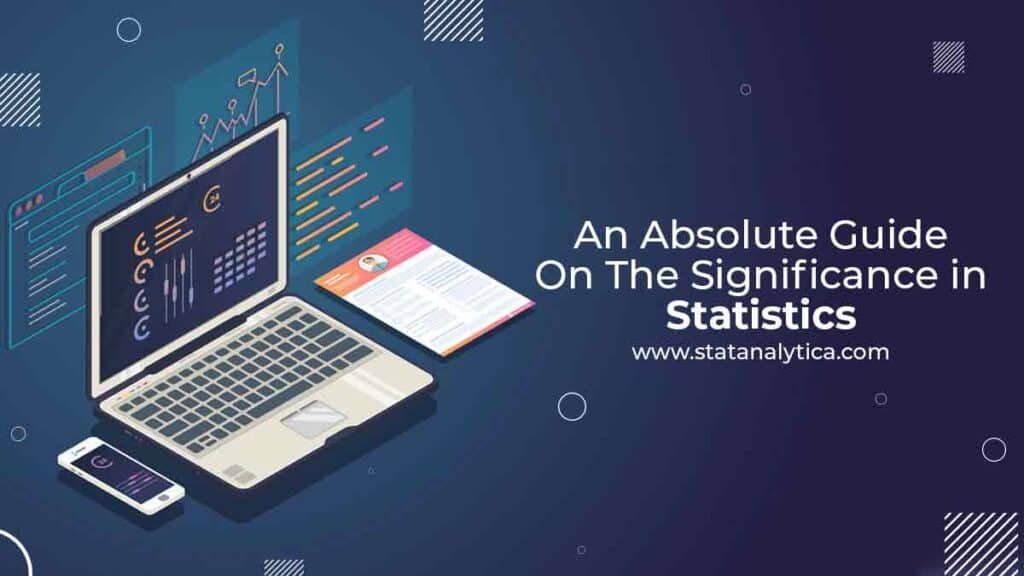Statistics is the mathematical expression of large data in a presentable manner so that data analysts can analyze such data and make decisions and predictions thereon. There are various statistical methods used to make such decisions and predictions efficiently and effectively. Thus, statistical significance is one of such leading methods. It is basically used to find out the plausibility of any result so that you can check if such a result is reliable or not. Read each and every minute detail related to significance in statistics.
What is statistics?
Table of Contents
Statistics is defined as the form of mathematical analytics which is used to present the quantitative and qualitative data in a systematic way so that different statistical tools and techniques can be used thereon and thus such data can be interpreted and decisions can be made accordingly. It is also used to make future predictions in relation to such data.
In short, we can say that statistics includes a number of methodologies that can be used to store, view, review, analyze, interpret, model, visualize and draw conclusions from the large structured and unstructured data. This is why the significance in statistics has widely escalated. The business world completely relies on statistics as all of its decisions are based on statistics. Statistics are also used to check the progress of such decisions. There are various popular statistical methods and measures such as Mean, median, mode, standard deviation, variance, kurtosis etc.
Let’s have a look at the types of statistics –
Statistics works in two ways which are defined as descriptive statistics and inferential statistics. When we collect the data and describe it in a summarized way that is known as descriptive stats and when we use that summarized data to explain the descriptive kind is known as inferential statistics.
- Descriptive statistics – The data is described in a summarized way that is descriptive stats and the summarization is done by the sample of the population using different parameters like Mean or SD. You can present by using charts, graphs, etc.
- Inferential Statistics – When you collect the data, analyze that data and summarise to describe the meaning of that collected data is known as inferential statistics.
Significance in statistics : Understanding of statistics
Data analysts use statistics to characterize the data set. In statistics, the study is based on the samples thus statisticians draw out the samples from the larger population and then they interpret such samples and thereafter whatever outcomes come will be applied to the whole population.
Understanding of significance in statistics
If we see the literal meaning of the word significance then it means ‘important’ and in statistics, it has a different meaning. Significance in statistics means ‘probably true’ or ‘probability of happening or non-happening of an event and such probability is not due to chance.
Thus, If a statistician wants to say that the particular result is highly probable then he would say that such result is highly significant. Likewise, if they want to say that the chance of a particular result is very low then the statistician would say that the result is highly insignificant or less.
Therefore, probability of the result is directly proportional to the statistical significance of such results.
Highly probable result – highly significant
Less probable result – less significant or insignificant result.
Takeaway usage of significance in statistics
- The next point to learn significance in statistics is that it is basically used to check the likelihood of a pattern in the data which is caused due to chance. You want to believe it or not, any data depends upon the significance of the result arising from such data. For example, if the probability of any result out of the data set is 95% then it means that the chance of the result being true is 95%. On such a basis, statisticians make interpretations and conclusions from the data sets and thus on the basis of such conclusions and interpretations they make future predictions and decisions.
- Suppose you want to find out the probability that the relationship between two or more variables is caused by a particular reason which is independent of any chances then in such cases you can apply statistical significance to find out the likelihood or plausibility of causes for such relationship.
- Next point to learn in significance in statistics is that it is used by statisticians to give evidence in relation to the probability of the null hypothesis. As the name suggests, you can find out the significance or probability of any statistical data.
- Significance in statistics has become a statistical tool which is widely used in the business world to check whether the finding is significant or not. It means that whether the result can be trusted or not so if the result is highly significant then it can be trusted and if it is insignificant then its chances of happening is very low so you will never trust such a result.
Why is study “significance in statistics” is a must?
The next concept to learn in statistics is the importance of significance in statistics has the world –
- To check the reliability
Significance in statistics is the mathematical expression of the plausibility of certain results. So on the basis of the significance of such results you can decide the reliability of such results. Thus, if the result is highly significant then you can highly rely on such a result and if not then you can reject such a hypothesis.
- Better decision making
In the business world, all the decisions are based on data sets and data analysts make decisions. Thereafter, they predict the results of such decisions and such results are favourable then their statistical significance is checked and thus if such favourable result is highly significant then you can opt for such decisions otherwise you will have to make any other decisions. Thus, we can say that significance in statistics plays a vital role in the business world especially in decision making.
Data analytics
Data analytics is completely based on the statistical significance as the data is analyzed in a way that we can find out the significance of the conclusions and interpretations drawn from the data.
Conclusion
Statistics are difficult to understand and a little bit complicated but not impossible to understand. When you collect the data and want to use it for the calculation then you use statistics. Statistics are used to calculate population and many more things.
Significance in statistics is an important concept of statistics. It seems complicated Prima facie but it becomes easier if you know what it is and how it is used in statistics. We hope now you know the basics of statistical significance and in case you are facing any difficulty insignificance then you can contact our expert panel anytime for further explanation. Get the best statistics homework help online.


